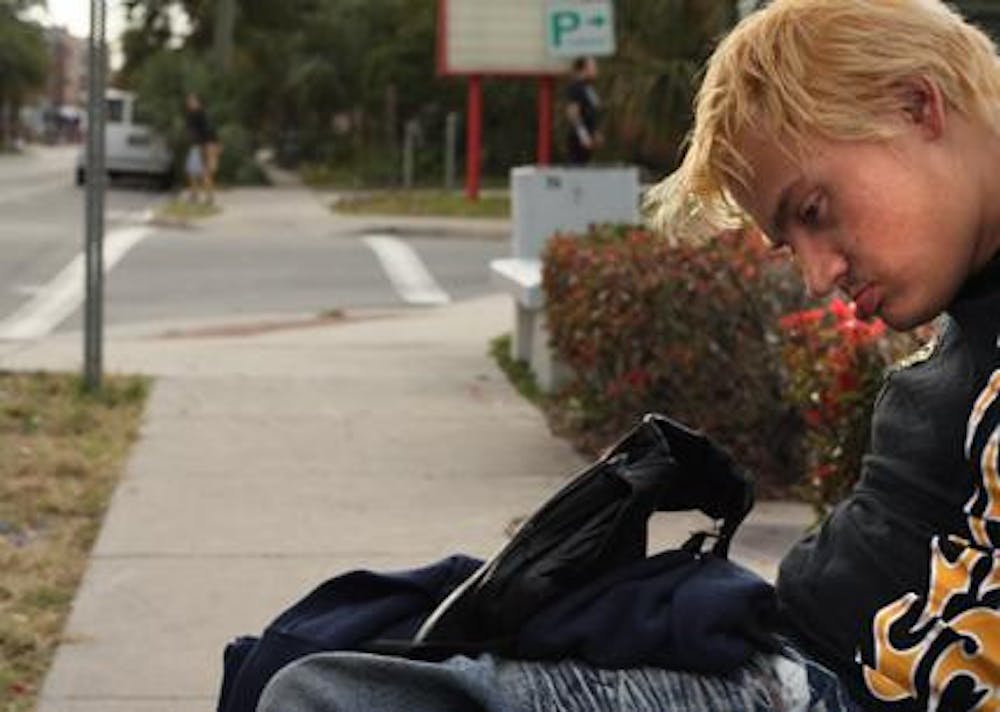Rafal Strzalkowski said his mother knew something was wrong when he was 12 months old.
He couldn't stand up.
Strzalkowski was diagnosed with cerebral palsy a few months later.
Now, at 29 years old, his bright yellow Kuschall wheelchair rolls downtown like a rover, passing from coffee shop to restaurant - then back to coffee shop.
Clothed in a dark blue UF Fredric G. Levin College of Law sweatshirt, he spools down Main Street at a steady, unhurried speed, carefully evading potholes in the bricked road like land mines.
Strzalkowski never sits still. He may be a bleach blond head that drifts by in a glance out the car window or just another working soul in a Starbucks lobby.
"I'm one of the most recognized people in Gainesville," he said.
Almost Invisible
Strzalkowski was born two months premature. An incubator kept him alive for a few weeks. But the lack of sufficient oxygen at birth made him a spastic quadriplegic. He lost control of all four limbs, and his muscles constricted at random.
He also lived behind the Iron Curtain. In the late 1970s, Communist Poland forgot the disabled, he said, and children hid away at "special schools."
Strzalkowski may have been just another invisible child left behind had his parents not forced him into a regular lifestyle.
"Communism was about people being happy and having hope and faith," he said. "The disabled didn't really fit into the perfect picture the communist society would always try to create."
He said his parents did not know the extent of his disability.
"My parents insisted that I be as normal as I could," he said, in an accent meshing English, Polish, German and Hungarian.
From ages 7 to 10, Strzalkowski traveled from Warsaw, Poland, to Budapest, Hungara. There, he attended the Petö Institute - the world's leading conductive education center.
Conductive education, developed by András Petö in the 1930s, is a method of rehabilitation for people with motor disorders of neurological origin, such as cerebral palsy.
Through treatment, it helps to recondition the brain to re-learn certain tasks after performing them multiple times.
Strzalkowski said one activity that stimulates balance placed the children on top of large blow-up balls.
"You stand up and turn your head - up, down, count to 10 and repeat," he said.
Strzalkowski went through different forms of treatment until he was 16.
Now he holds a pearly white coffee mug with his left hand and gently brings the frothy beverage to his lips.
He has limited control over his right hand, which clutches a small black bag with his wallet, phone and passport. His two legs are still impaired, with restricted movement in his knees. If he tries to stand up, his legs remain in the 90-degree position, so he is stationed in his chair.
"I was very fortunate to be in the condition that I am," he said. "People with this condition often have no control over their hands and legs, and they can't move them with any control."
But throughout his childhood, his parents insisted on keeping him in mainstream schools.
"We learn, and we are shaped into who we are throughout interactions, social skills and talents," he said. "And if you have a kid that has so few avenues for interaction with the environment, the implications can be great."
Strzalkowski knew many children with his disability, and after his success at the Petö Institute, many Polish parents in his community took their children out of special needs schools.
"Kids learn from one another, which means that they also pick up their bad habits," he said. "So creating an environment that is not competitive or stimulating really drives you down. Not only are kids not learning, but they are harmed by the experience in a special school."
But it was illegal for Strzalkowski to attend a normal school in Poland because the government mandated children with his condition attend special or home school.
However, his parents made arrangements with teachers to have him in a normal classroom to receive an education.
At the time, schools in Poland were not wheelchair-accessible. So his parents lifted him on their backs - up two flights of stairs every day to secondary school - until he graduated from high school. As they kept up the routine, his parents developed back injuries as they grew older.
"This is how determined they were to make me succeed," he paused, letting out a deep breath. "It's very easy to give up. Most of the parents didn't really go to extremes like my parents did."
The expectation during pregnancy is that the child will be born healthy, said James Klausner, director of the Gainesville Conductive Education Academy, which works with children who have neuromuscular disorders.
"We should all withhold judgment unless we truly understand the amount of pressure that's put on the parents," Klausner said.
If parents discover that the child is impaired, they can feel helpless.
"Emotionally, that's just devastating as a parent," he said.
After he was born, Strzalkowski's parents needed to think about his health and future.
In the Strzalkowski household, life didn't come easy. People with disabilities in Warsaw weren't expected to travel around the city or go to movies and stores.
The reality of elevators didn't exist in Poland, still marked by thousand-year-old Gothic architecture, he said.
He learned English partly from watching "The Facts of Life," "Different Strokes" and "The Wonder Years" on television, the few American shows broadcasted in Warsaw at the time.
Strzalkowski's mother joined him when he watched "The Wonder Years" and compared him and his brother Jacek, 36, to the stereotypical, aggressive relationship between the two siblings on the show.
"Jacek would beat me up because he was older," he said. "We were never in that kind of lovey-dovey relationship. We called each other names, but I would always fight back."
An End and a Beginning
Jordan Hamilton Klausner was born on May 12, 1993.
After complications at birth, he lost significant control over his body - a result of cerebral palsy.
He received conductive education at 2 years old and was determined to overcome his disability.
Jordan died in 1997.
His father, James Klausner, created the Jordan Klausner Foundation, a public charity based in Gainesville offering opportunities at the academy.
"If you can imagine somebody who can't interact with you, can't talk, can't move, is very bright and is trapped inside his or her body," Klausner said, "it's very difficult to educate an individual that has that difficulty."
Klausner, a UF mechanical and aerospace engineering professor, met Strzalkowski through students who volunteered at the center.
"If you look at Rafal and talk to him, you don't realize how severe his disability is," Klausner said.
This severity led to difficulty enrolling in Warsaw schools.
Many schools discouraged him from continuing his plans for law school, telling him classes were too difficult, crowded and inaccessible to people in wheelchairs.
Strzalkowski took the acceptance test anyway, and after a few attempts, was accepted to the Warsaw University Faculty of Law and Administration.
"My first reaction was panic," he said. "And then I passed the exam with flying colors. So I was ecstatic. I thought I was going places at that point.
"I thought, 'Wow, I'm going to be a lawyer.'"
Once he graduated summa cum laude in 2003, he realized being in a wheelchair made it difficult to find a job in Poland.
"You kind of hope as you go along that the world changes with you," he said. "So maybe things would get better by the time I'd be done. And 25 years from now, it may be a country like any other. But I don't have 25 years to wait."
Strzalkowski left everything behind in Poland.
In 2004, he traveled alone to the U.S. to enroll at the UF law school's LL.M. in Comparative Law Program. The one-year program trains lawyers from other countries to learn about the American legal system.
He knew what his purpose was: to practice law for human rights.
"I am going to be sacrificing my career to help other people," he said. "I plan to give most of my money away because I don't think I'll ever be able to spend it all on myself. How many kitchen tops do I really need?"
After he met Klausner, he knew where he was needed.
When Strzalkowski graduated from the UF law program, he volunteered with the foundation, one of the few rehabilitation centers in the country.
He served as a model of success and encouraged students to continue their rehabilitation.
"The fact that Rafal is completely independent, is able to travel to the U.S. on his own, get a master's degree in law and now is pursuing a juris doctorate in law school, it's amazing that he's been able to achieve this much" Klausner said.
After about 9 years of combined schooling in law, Klausner offered Strzalkowski a position as assistant director of the center. But because he's not a U.S. citizen, Strzalkowski hopes to obtain a Visa for Aliens of Extraordinary Ability and labor certification through the Jordan Klausner Foundation.
As immigration holds up the process, and with another graduation in one semester, he is running out of time.
He may face deportation and would have to find other means of obtaining citizenship in the States.
"I did have thoughts like, 'Maybe I should give up?'" he said.
He said the problem with immigration is that it isn't able to understand what impact he may have on people's lives, such as serving as an advocate for conductive education in the U.S.
"When you establish someone's merits and qualifications, it's not the number of degrees you hold, it's the quality of experiences," he said.
With A Little Help
Joshua Kaller was walking back from a party on Museum Road at 2:30 a.m. during his freshman year at UF.
Across the parking lot, he spotted Strzalkowski at a nearby bus stop, sitting under the dimly lit overhang. Curious, he walked over and began a casual conversation, knowing that Strzalkowski may have missed the last bus of the night.
"I coerced some friends to drive him home," Kaller said in a phone interview.
Four years later, Kaller attends American University in Washington, D.C., where he receives weekly phone calls from "Raf" about his remaining time in Gainesville.
Throughout college, he would "adventure around" with Strzalkowski, helping him with errands and joining him downtown for karaoke night.
"There's something about Raf's personality," Kaller said. "He's upfront, candid and too honest. He has a pure love for people and doesn't have many limitations."
But when Strzalkowski took the Law School Admissions Test in 2005 for the first time, his limitations resurfaced.
He was denied disability accommodations during the LSAT exam by the Law School Admissions Council, which ultimately affected his score and instigated a rally outside of the law school after Halloween that year.
"The rally was about making the law school aware of the practices they were promoting," Kaller said, who organized the assembly.
"It was humble and small. It wasn't a Martin Luther King rally."
Six months and a few extra classes later, Strzalkowski was accepted to the UF Levin College of Law.
"We never knew if this was clear evidence from the rally, but we like to think it made some difference," said Kaller, who now attends law school because of Strzalkowski's impact on his life.
Strzalkowski is a minority, Kaller said, because being an immigrant and disabled are two of the biggest hurdles to overcome.
"It's the hard times that make the good times so much better," Kaller said.
Strzalkowski still manages a seven-day routine. He hops on the bus downtown almost every night.
Saturday nights in Gainesville are usually spent at Market Street Pub. On karaoke nights, he'll grab the microphone and sing Journey's "Don't Stop Believing," as the entire bar bursts into song like a raucous choir.
If the week's workload isn't too much, he'll start the weekend early with a few Long Island Iced Teas at The Top on Thursday evenings for the $2 drink special.
"I do have a weekly routine," he laughed.
"As I'm getting older and older, I find I'm getting more and more predictable."
And he knows where to draw the line.
"Law school is four hours of class and eight hours of reading," he said.
In the classroom, his friends push him to succeed through weeks of trial practices and studying.
"Because of the struggle, I will be very disappointed if he does not create more advocacy, more change, to push the block of progress forward one more inch," Kaller said.
The Long Ride Home
Strzalkowski waits at a bus stop off Main Street after a long night of karaoke. The corner streetlamp casts a long shadow on his pale face.
A few minutes pass. The Later Gator B arrives on time. He doesn't wave it down.
The wheelchair lift creaks, lowers and lifts him up inside the bus.
The driver helps him with his seat belt.
The motor rumbles.
Strzalkowski is on his way.






